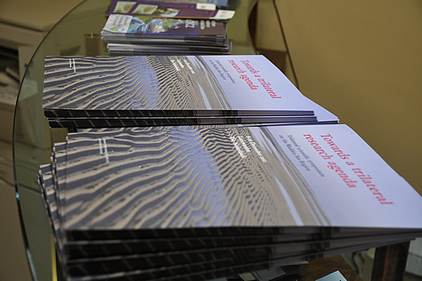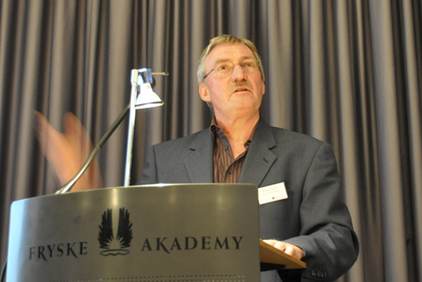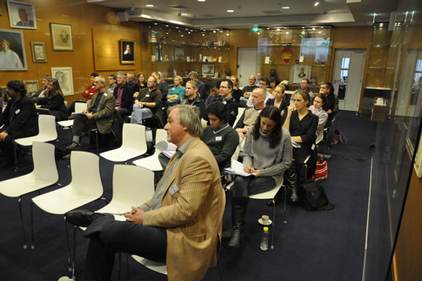Report of the symposium 8-10 December 2010
From 8-10 December 2010, over 200 participants from Germany, The Netherlands, Denmark and elsewhere came together in Leeuwarden to exchange knowledge and ideas on the future of trilateral Wadden science. The symposium not only crossed the borders between countries but also the borders between disciplines. The programme included presentations on history and heritage, geoscience, economy and society, ecology and climate.



8 December
After an introduction by Pavel Kabat, chair of the Wadden Academy, the participants were welcomed by Ferd Crone, mayor of Leeuwarden. His speech was followed by a welcome address by Jaap Verhulst, on behalf of Henk Bleker, State Secretary of the Dutch ministry of E, L & I. John Frederiksen, the Danish representative in the Wadden Sea Board, completed the formal opening of the symposium.



The scientific part of the symposium started off with a session on History and Heritage, which comprised of presentations on cultural historical, archaeological and landscape research in the Wadden Sea Region. It was followed by the Geoscience session which included research on the deeper subsurface, the evolution of the Wadden islands and sediment dynamics in the intertidal area. The two sessions both addressed the question of how sea-level rise has shaped the region in the past and how it will determine its future.



At the end of the first day, the 2010 Wadden Academy award for the best Wadden-related Master's thesis (University level) was handed out to Bas van Leeuwen. Bart Zeegers received an encouragement award for his Bachelor's thesis (College level).
In the evening, participants continued their discussions with colleagues during the conference dinner at the Natuurmuseum.






9 December
In the morning five parallel workshops were organised in close cooperation with the Dutch restoration programme Towards a Rich Wadden Sea. The workshops were characterised by a positive atmosphere and lively discussions between the participants.
After lunch, three additional scientific sessions were held: Economy and society, Ecology and Climate. The first session dealt with the social impact of landscape change and the rural development in the Wadden Sea Region. In the second session attention was paid to various subdisciplines in ecology, including phytoplankton research, bird studies and research on how invasive species change the food web. In the final session, the first two presentations focussed on climate change and its effects on the region. In the final presentation cutting edge research on the biogeochemistry of the tidal mudflats was presented.
10 December
The final day of the symposium started with a presentation by Pavel Kabat, who provided a systems science context and a short review of the construction of the Dutch research agenda of the Wadden Academy, which may provide a basis for a trilateral research agenda.
The morning programme was split up in three parts: pertaining research questions for the trilateral Wadden Area, current international research programmes and options for funding of new trilateral research programmes.
In his presentation Harald Marencic (CWSS) showed that many research questions have been posed in the Quality Status Report 2009. Hence this document provides a valuable basis for the construction of a trilateral research agenda.
Karl Reise (AWI) gave his personal view on future directions of Wadden research with reference to the inscription of the Wadden Sea as a UNESCO World Heritage site. After coffee, three presentations set out existing international programmes, including Interreg and LOICZ.
At the end of the morning session, NWO and BMBF announced the first transnational call for research in the Wadden Sea Region. The call was signed by Dr Frans Martens (NWO) and Dr Peter Seifert (Project Agency Juelich). After lunch Geert Jan Arends (RUG) gave a presentation on the upcoming 8th framework programme of the EU.
The symposium ended with a panel discussion on important research questions for a trilateral research agenda. The discussion was moderated by Franciscus Colijn (HZG). For the five main research themes, key questions were presented which were commented on and amended by the panel and the audience. Apart from detailed suggestions and comments there existed a large amount of consensus on the presented research questions. A specific point raised was the presentation of results from some smaller pilot projects to keep people informed on the results of the work of the Waddenacademie. Several of the questions arising from sea level rise and sediment dynamics and consequences of introductions of novel species will be covered by the joint BMBF - NWO call for bilateral research.
Pavel Kabat closed the meeting and thanked all participants for a stimulating symposium.
The symposium took place in the run-up to the 13th ISWSS, the International Scientific Wadden Sea Symposium, which will be held in 2012. The 13th edition of the ISWSS will be organised by The Netherlands; the Wadden Academy has been invited by the former Dutch Ministry of Agriculture, Nature and Food Quality to take the lead in the organisation.
Photography: Zwanette Jager (www.ziltwater.eu).


















